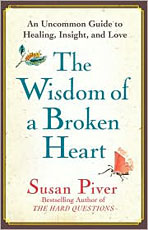"Last summer I attended a month-long meditation retreat. We practiced meditation for as much as six or seven hours a day punctuated by occasional dharma talks from a meditation instructor. Every few days our teacher himself would come to discuss an aspect of spiritual view or practice and then we had a question-and-answer session. One day he gave a particularly incisive, inspiring talk on the importance of cultivating genuine compassion, which is so much more than just being all nice all the time. When you realize the nature of compassion, he said, you realize the nature of reality. You become enlightened. It was time for us — his senior students — to really go for it and devote ourselves to becoming enlightened for the benefit of all beings. He discussed details of how to cultivate compassion and pitfalls we might look out for.
"I had already spent some years working on developing compassion, but I seemed to run into the same snag over and over — an inability to open myself to the suffering of others without just falling apart and either dissolving into tears or pretending I wasn't about to. When I practiced opening myself to my own suffering and the suffering of others, at a certain point it would become unbearable and all I could do was cry. When I thought of the people on the news or the fact of my parents' aging, or just the everyday suffering we all experience (losing lovers, failing at work, etc.), I couldn't help it, I would just sob.
"When it was time for questions, I decided I had to ask him if sobbing uncontrollably has a role in cultivating compassion. It just felt so destabilizing. Surely this couldn't be what the Buddha was recommending as the path to enlightenment or a helpful gift I could offer others. When it came to empathy and care for my fellow humans, wiping my nose on their sleeves did not seem like the best thing I could offer them. But then what?
"When I got up to go to the mic and ask my teacher this question, I could feel these very same tears stinging behind my eyeballs. Oh no, I thought, I'm going to cry when I ask him about crying. This is awful. But I have to do it. 'Sir,' I said, 'when I attempt to rouse compassion by acknowledging suffering, the more I let in the truth of suffering, the more likely I am to collapse in tears. Surely this isn't the intended result. How can I move past this?' He looked at me with such kindness and said, 'You know, some of the world's greatest meditators have cried a lot.'
"I've been thinking about his answer ever since. I've been conjuring images of the world's meditation masters and sages, such as the Buddha, Jesus, and Gandhi, and trying to picture them, not as implacable adepts who always knew what to do and say, but as human beings who cried — under the Bodhi Tree, atop the Mount of Olives, in a prison cell — for all of us. But then what? They didn't just wipe their eyes and return to their lives, hoping for the best. They gained something from their tears. They learned something from them. They weren't reduced to a weakened condition; they were made stronger by their tears and were left with a greater capacity for love, not less.
"As you recognize and admit your own strong emotions, you give yourself more inner space to accommodate them. You don't center on getting rid of pain and creating a situation where you'll never feel such pain again. (Much as you might wish never to feel it again.) Instead, you let these deep, painful emotions create the perfect circumstances for you to become a more truthful version of who you already are. One thing is guaranteed to arise from this self-discovery: enduring happiness. It is a wonderful truth that, buried in the muck and mire of that most devastating of emotional difficulties, a broken heart, is the possibility of freedom from suffering."
